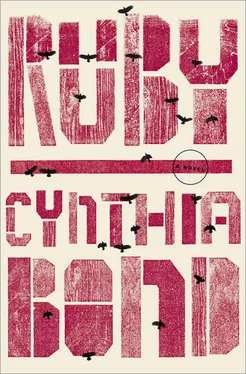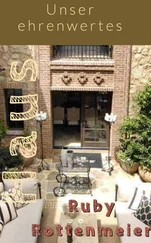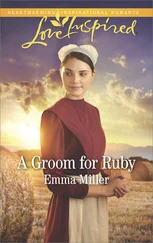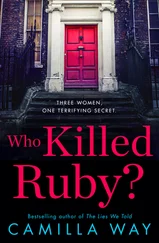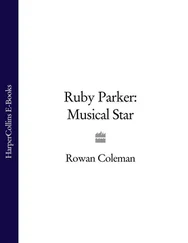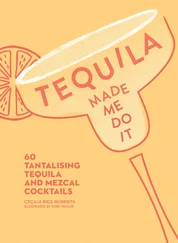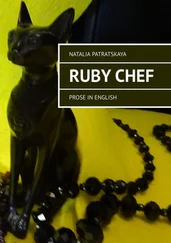The afternoon sun reached in through the window and slanted against his hands. He felt his breath quicken. He turned and Celia was there, standing behind him.
“You going somewheres?”
“Yes’m.”
“In that shirt? You wrinkled it sleepin’. Take it off and I’ll pass the iron over it.”
It was a moat he had to leap over. “It’ll be fine.”
“You sure you ain’t feelin’ too poorly?”
Tingling began to creep into his left hand. A ring of fire to hurtle through. “I’m quite well.” He took the cake and reached for the glass cake cover.
Celia spat, “I’ma need that cover later.” She took it out of his hands.
Ephram swept into an open drawer and retrieved a plaid cloth. The sun pulled at his sleeve. “I’m going Mama.”
Celia turned quickly and whisked down the hall, tripping and falling into the wall, tilting the Reverend’s portrait. “I told you ’bout this cane!” Drawbridge lifting. He would have to jump. “Help me with this here.” She held the portrait up.
With the cake perched in one hand he jerked down the hallway, lifted the framed picture and righted it, then leaned and kissed Celia on the cheek. “Love you, Mama.” He unlocked the door with one hand. “What about this here cane? EphRAM!” Drawbridge rising higher. He leapt free onto the front porch, but stumbled on the bottom stair. A pillar of will sent the cake up and out of his right hand. It was falling, flat and hard towards the earth. Time slowed. The yard spun before him. Then he swooped under the falling circle, fell to one knee and caught it in two steady hands. The cake quivered under its cloth but did not crumble. Ephram could have sworn he heard a holy jubilation, a swell of cheers from the passing clouds.
He turned and it was only Celia. Doubled over in the blackened doorway, guffawing into the open air.
He lifted himself and almost ran to the front gate.
“Cain’t make it out the yard much less down the road.” Her laughter barked and cut through the air like flying bullets as he unfastened the latch and scurried down the road.
“Goin’ courting ’n’ cain’t walk two feet ’thout fallin’ flat. Oooooo hoooo! Ooooooooo hooooo! Even crazy gonna throw that fish back. Ooooooooo hoooooo!”
Moving. Steady. Moving away. A slim tear in his pants leg, knee bleeding in slow tender drops. Ephram heard her porch laughter as he walked stiffly down the road. It didn’t fade until he had covered nearly a mile in distance, the clay pathway gathering small drops of his blood like bread crumbs.
Ephram felt the sun warm the back of his neck. It glowed against his dark skin, calling forth a thin sheen of sweat. His breath was slowing some. The faint scent of Johnson’s Baby Powder kept him company. Calmed the rocket in his chest.
He sat on a tree stump beside the road and situated the cake on a tuft of grass, tucking the corners of cloth under the plate, a Maginot Line against red ants. It was then he realized he’d left his old hat. Maybe, he thought, it was best to keep the thinking that had been ground into it, right where it was. Ephram took a quick sip from the flask in his pocket — felt the warm liquid burn and smooth the rough of his throat. He opened the kerchief he’d hidden for over thirty years, and saw the same two dusty Black dolls with red cross eyes. One with a silver ring about its waist, the other with a lodestone tied to its back. He tried not to think about how he came to have Ruby’s in his possession. He closed his eyes against the why of it and pushed it back into a well in his mind. He then slipped the dolls into his front pocket. Still bleeding, slacks torn, he caught sight of his Timex. Three forty-five. Late. But there were still a good three and a half hours of daylight left. He picked up the cake and began walking southwest towards Ruby. Late. But if he hurried, still time enough to stop by P & K for a bit of iodine and cotton. Maybe a needle and some brown thread.
A few of the Rankin brothers were out working their seventy-two acres when he passed. From this distance, little men in dark coveralls lifted hoes only to let them fall. But up close all seven of the Rankin men towered above six feet. Chauncy Rankin, whom Ephram had secretly envied the whole of his life, was the tallest, boldest and most handsome of all the Rankins. “Six foot fo’,” he often bragged over dominoes and cola. Then said, winking, “Then add two mo’.”
Supra Rankin, the matriarch, rang the dinner bell. Every man stopped dead still, dropping hoes and bags, and strode like small giants to the Rankin house. Ephram kept walking.
He saw the stretch of road before him. Narrow and red — too small in fact to fit most four-wheel cars. It had been cleared when the town lived on horseback and bootheels. Most folks viewed it as impolite to go barreling down the road. So the people in Liberty traveled by foot, horse, or mule save when supplies were brought in to P & K and a few other locales. The Red Bus to Newton, taking janitors and housekeepers to work, was another exception.
He passed the In-His-Name Holiness Church, Pastor Joshua wielding chalk and board in the front yard. Each Saturday the Pastor wrote some headline of scripture pertaining to God’s judgment on the old blackboard and rolled it out to the road, where folks on their way to Bloom’s Juke would be sure to stumble upon it and rethink their almost-sin.
In Liberty, Pastor Joshua was one of two men well-known for stammering, but if Paul could withstand a thorn in his flesh, like in Second Corinthians, Pastor Joshua was more than happy to oblige God’s will.
The Pastor was dabbing his forehead against the heat as the cloud of chalk dust settled into his skin. He had almost finished an abbreviated, hard-hitting bit of scripture:
Because I have called, and ye refused; I have stretched out my hand, and no man regarded … I will mock … when distress and anguish cometh upon you. Then shall they call upon me but I will not answer; they shall seek me early, but they shall not find me . Proverbs 1:24–28.
It was one of Celia’s favorites.
Pastor Joshua turned from his work. “Good afternoon Ephram.”
“Afternoon Pastor.”
“Where you off to with one of Celia’s cakes?”
Ephram stared into the Pastor’s eyes and, for the first time since he’d known him, uttered a bold-faced lie, “Mo’s wife is poorly.”
“Her dyspepsia flaring again?”
“I believe so.”
“Well, you give Bessie and Mo my best. They haven’t had a Sunday off since they started working for them Goldbergs in Burkeville.”
Ephram nodded yes lest he give voice to another lie.
The Pastor, reviewing his own handiwork, eulogized, “Sh-sh-shame ’bout old Junie Rankin. Donated more than p-p-plenty to the church fund when he c-come last Easter. He will be missed.”
“He surely will.” Ephram’s heart pinched at the thought while his feet itched to keep walking. He kept his lips pressed tight, lest he inspire one of the Pastor’s on-the-God-spot sermons.
Thankfully the Pastor said, “Now you boys come nice and early Monday morning to set up for the funeral.”
“I will Pastor. I got the whole of Monday off from the store.”
“Good. Good.”
“Well good evening to you,” Ephram managed as he edged away.
“Good evening.” Then he paused a moment, his eyes finally taking Ephram in fully. “You always such a help to this church. Set a fine example.”
“Thank you Pastor.”
“See you tomorrow son.” At that the Pastor patted Ephram’s back, chalk dust billowing about and sticking to his warm neck.
Five steps away from the church Ephram saw the rooftop of Bloom’s Juke. It stood just across the road and down the rise, brazenly selling bootleg Saturday night straight through to Sunday morning so that good church folks on their way to service passed the weaving and the drunk on their way to bed. As Liberty had been situated in a dry county since Prohibition, it was desperately in need of Ed Bloom, otherwise known as Liberty’s “pocket apothecary.” Ephram remembered how Bloom, a tobacco brown bootlegger from Livingston, had come to Liberty after his brother, Shep Bloom, had been run off by the lobster red sheriff from Newton. But only after Shep had cheated the sheriff out of his 50 percent. So Ed had come in his brother’s stead, with a renegotiated 60 percent cut in the lawman’s favor.
Читать дальше
